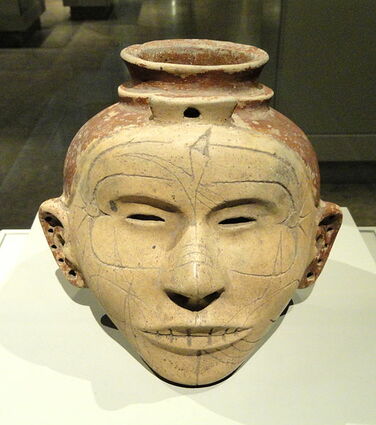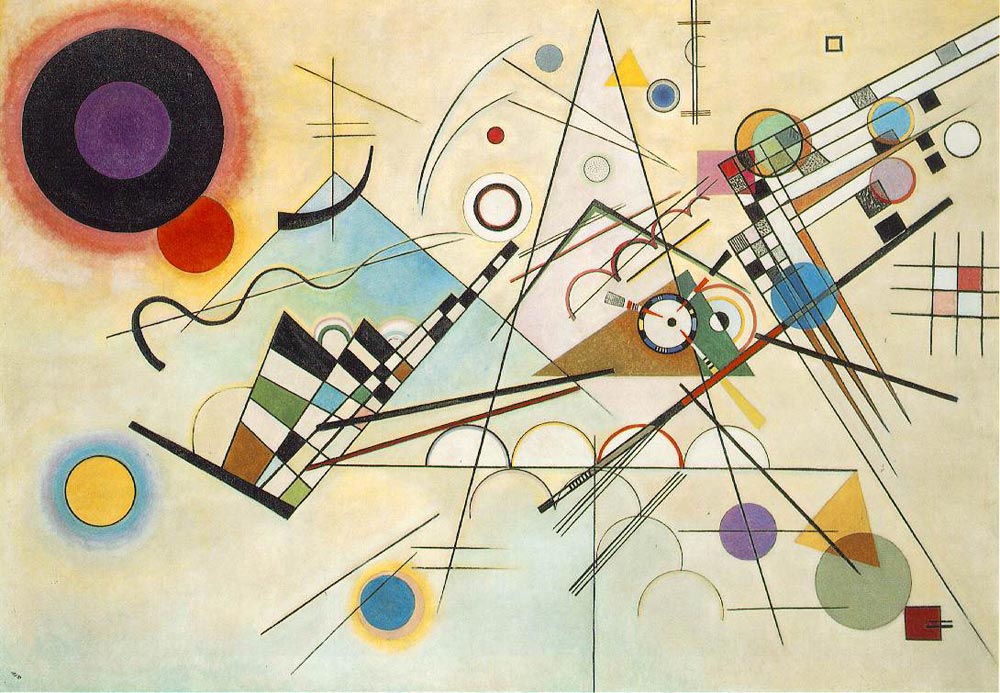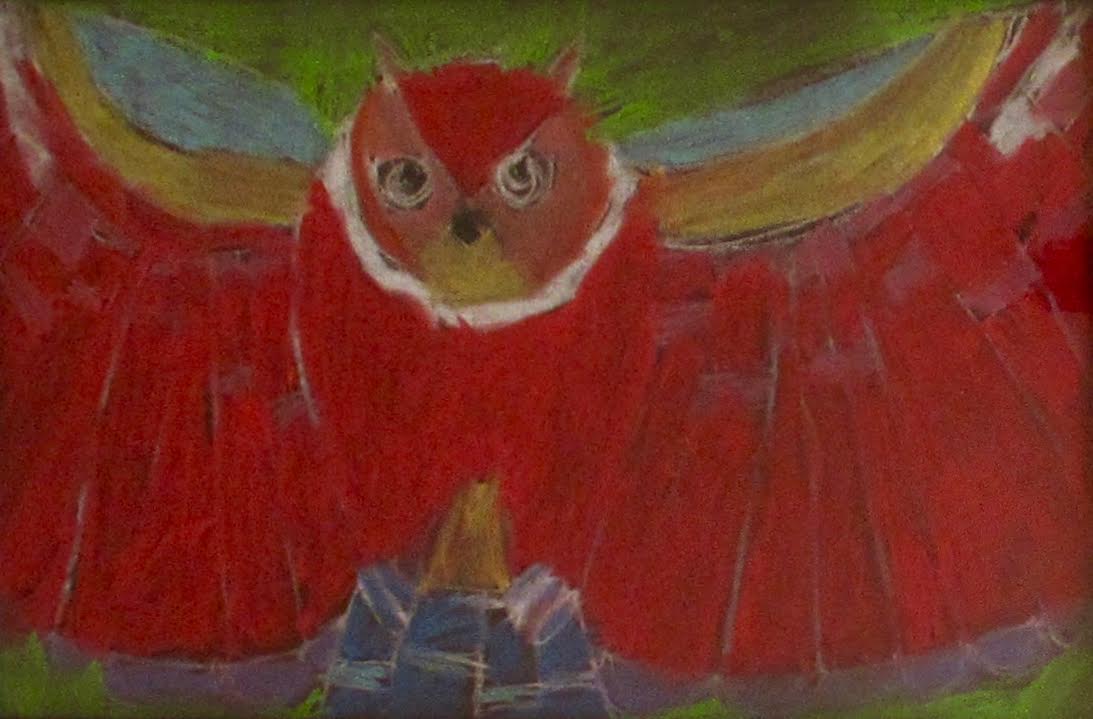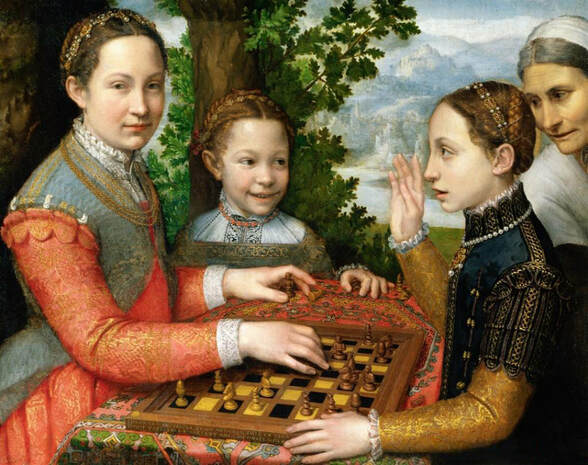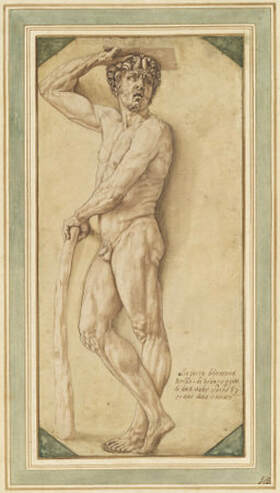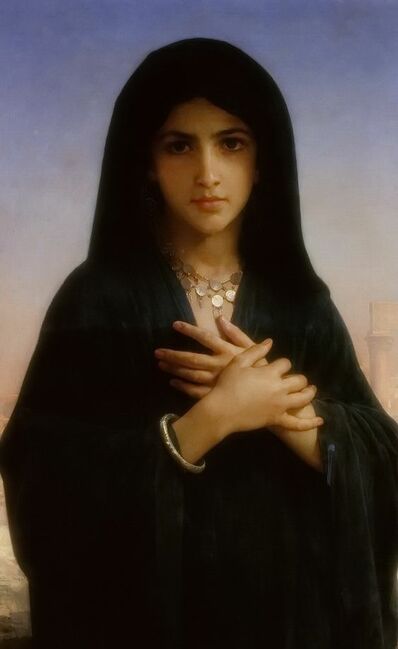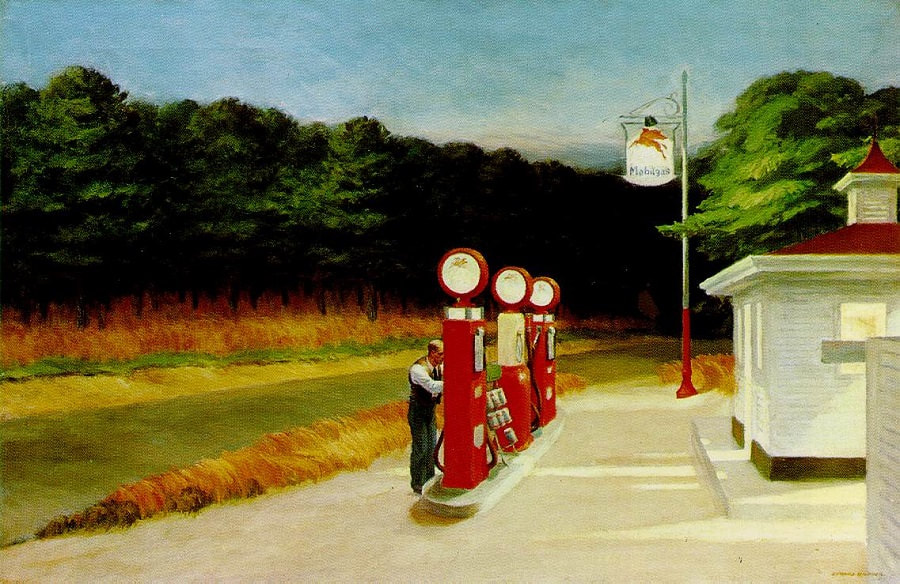|
Human Head Effigy Jar for A.L. Imagine if a light were set inside this ancient figure of a human head. Could these deep eyes alive and deified connect us with the wisdom of the dead? Whatever consolation we might seek, this intercessor only comes to hear: the lips are sewn. The image cannot speak. Perhaps some golden gift adorned each ear. We ponder lines incised upon your face, mysterious symbols that we do not know, divided now from your ancestral place. Yet in the flicker of that inner glow, we share the wonder of the mind within, life made of common clay, our human kin. Barbara Loots Barbara Loots volunteers as a docent at the renowned Nelson-Atkins Museum of Art in Kansas City, Missouri. Her poetry collections are Road Trip (2014) and Windshift (2018) from Kelsay Books (and amazon). She can be found online at various poetry sites and her blog at barbaraloots.com.
0 Comments
Lines on Kandinsky's Composition 8 Vibrations in the soul, yes. Please note the discography the metronome the phonographic I & all the rattling death marches. In the villages the crimson swirling capes catch fire & fanfare chromatic, misted moons. Include mountains and melodic signatures. Must live ably within two bodies (something like a faun?) How we marched through fog along the steppes but is history a grid? If grid, define the lines via some auditory principle-- each colour has a vibration, an origin story in the earth. A thread of river & a dynamited bridge—can we say this is a project of recovery? Suppose I leave you wondering about the pink triangle. I refer you to the dawn's tender ice melt, the duple key of F. Carol Alexander Carol Alexander's poetry appears in various anthologies including the ekphrastic 2017 Resurrection of a Sunflower (Pski's Porch Publishing), Broken Circles (Cave Moon Press), Through a Distant Lens (Write Wing Publishing) and Proud to Be: Writing by American Warriors, Vol. 1.Her work can be found in numerous print and online journals such as Bluestem, Caesura, Canary, Chiron Review, The Common, Matter, Poetrybay, San Pedro River Review, Split Rock Review, The New Verse News, Soundings East and forthcoming in The High Window, Southern Humanities Review, J Journal and elsewhere. She is the author of the chapbook Bridal Veil Falls (Flutter Press). Habitat Lost, Alexander's first full-length collection of poems, is available from Cave Moon Press and Amazon (2017). Hit It Hokusai says ... pay attention, notice ... stay curious ... keep changing, you just get more who you really are. He says get stuck, accept it, repeat yourself as long as it’s interesting. – Roger Keyes A tire spins spits bits of loam wet, yielding fleeting traction quick transaction satisfaction shoulda coulda woulda put on chains drive through snow-blind night and traffic lights illuminating puddles squishy footsteps umbrella husks in bins a touch of gas, it spins and spins if only this would catch we’d drop it into gear be outta here before you had a chance to say what if Bill Arnott Vancouver author, poet, songwriter Bill Arnott is the bestselling nonfiction author of Wonderful Magical Words and Dromomania. His poetry is in the League of Canadian Poets Heartwood and Paper Dart Press UK PLAY anthologies. Bill’s poems, reviews and articles also appear online. This Owl is Forever (after a six-year-old daughter’s pastel drawing) Whether reading by the window or at the computer showing it my back it’s glaring gaze cuts through me so I know this Owl’s forever. . Within the frame it’s huge red wings reach out beyond the frame spread wide and open up opulent as the robing of an obese cardinal lifting faithful to their feet so I know the Owl’s forever. . What monstrous hands these wings if they were human here on earth. The owl forever stands on robust tarsals for when pummeling prey at 40 m.p.h. But her call is held at bay in two dimensions hailing from the wall in silent utterance. . In her head a curtain to a cancelled world eyes penetrating time at three-sixty degrees see through me even up-side-down unchallenged by earth’s changes. This Owl she is forever. . And below her feet tiny towns twinkle up to her in haze. Was she hissing in the air stalking vulnerable and pure? Who said the Owl was wise was wrong. This one here’s no barn owl and she don’t stand on no rafter. When we say our prayers this raptor could be taken for a fluffy red feather duster thick with purple pastel piping back of wings wiping pre-tense off before or after-- yes this Owl’s forever. . Made from tree bark chalk and milkweed she speaks now and says, “You are what you are. This will always be.” This Owl is forever after. Richard Becker Richard Becker is a concert pianist, composer and Director of Piano Study at the University of Richmond. He has had a Bread Loaf Scholarship for poetry, a Vermont Studio Center Fellowship as a poet, and, as a composer has been a MacDowell Fellow. Becker has published poetry in the U City Review, The Baltimore Review, America, Columbia, Cold Mountain Reviewand Main Street Rag. Zugschwang* *in chess, a situation where one is forced by the rules of the game to make a move, but all the possible moves are disadvantageous. Mother offers an afternoon match by the river, a lesson in parlour games en plein air -- simply pawns on the lawn, subject to the movement of knights, bishops, the rooks crowing, the royalty guarded but ever-ambitious. Nanny oversees the surrender to all that is inevitable. She starches the collar, braids the hair, demonstrates absolute control even in defeat. In the nursery, the first move is made – the rosy cheeks, the warm brocade. Later the clothes reflect the board, a black and gold echo of life squared away, the beginnings of feigned subservience. Over time the losses pile high – pieces toppled in sacrifice – her only choice to play the game or pretend. By look or by rook, she sighs, I’ll manage a checkmate in the end. Betsy Mars Betsy Mars is an LA-based poet and educator. Her parents instilled in her a love of language, culture, and social justice. She is passionate about animals, travel, and making up for lost time while striving to learn, read, improve her poetry. Her work has recently appeared in Tuck, Sheila-Na-Gig, and in a number of anthologies. Her first chapbook, Alinea, was published in January by Picture Show Press. ** A Distant Mirror My sisters and I played “chess” for years, sharpening our skills and sometimes our nails. We were good at making unpredictable moves on life’s game board, drawing a little blood, carving a few scars on our psyches. Yet, sisters, forever sisters, we were delivered from the same womb, bound by our mother’s blood and body. So for her 95th birthday, we called a cease-fire, laid down our pawns and bishops, horsemen and castles, a lifetime of skirmishes and jealousies to gather photos, banners, a star-studded tablecloth and napkins, coffee, lemonade—then order a half-chocolate- half-vanilla cake, butter-creamed with yellow roses for the Texas-born queen. Outside severe winds and rain whipped around the city, the house, an echo of our tornado-prone history. But our perennial game design, as we criss- crossed the board, had always been, to retain a sweet, sisterly image, good manners, deceptive smiles. Perhaps that’s why I see Sofonisba’s painting as a distant mirror of what we carried off so well. The Chess Game, a revelation of pecking order in Renaissance elegance, an Italian setting. Europa gives her older sister a charming, yet mischievous smile. Minerva, hand raised, concedes checkmate, to her older sister. And Lucia looks directly at the oldest sister, the artist who paints expressions that might tell other stories, ones that only the old servant, watching intently from the side, could tell us—as I hint at ours now. Sandi Stromberg Sandi Stromberg has appreciated how the challenges presented by The Ekphrastic Review stretch her as a poet and allow her to pursue different styles. She also loves gathering poets’ work into anthologies. She co-edited Echoes of the Cordillera (ekphrastic poems, Museum of the Big Bend, 2018) and Untameable City: Poems on the Nature of Houston (Mutabilis Press, 2015). Her poetry has been nominated for a Pushcart Prize, read on PBS, and recently published in the Houston Chronicle and San Antonio Express-News, as well as multiple small journals and anthologies. ** Why We All Became Painters Except Minerva, the Writer The middle sister with lace at my neck, pearls on the throat of a dress black and gold, I raise my hand to speak of the last move of the one who’s won at chess. We gather around, pretend to play, hot, sweaty, attired in our finest while Sofonisba, behind the canvas, gets all the attention when the paint dries. I will hold the brush one day. Kyle Laws Kyle Laws is based out of the Arts Alliance Studios Community in Pueblo, CO where she directs Line/Circle: Women Poets in Performance. Her collections include Faces of Fishing Creek (Middle Creek Publishing), So Bright to Blind (Five Oaks Press), and Wildwood (Lummox Press). Ride the Pink Horse is forthcoming in 2019. With six nominations for a Pushcart Prize, her poems and essays have appeared in magazines and anthologies in the U.S., U.K., and Canada. She is the editor and publisher of Casa de Cinco Hermanas Press. ** Rival What I imagined a coup de grace makes her smile. My lifted hand longs to slap away smugness. To be born second is to bear much. Guess how often “her highness” has made me the fool? Some day, some day, vengeance’ll be mine, sayeth the Lord. Only nurse behind me prevents hair pulling. Curse little sister as well, her minion, while I fight alone. And to have to wear her clothes and use her schoolbooks, never the chance to come to an idea first! I cherish hate like an ember, like a caverned dragon, loathe to temper even a single degree. (Hence the missed volta, resentment’s grim estate.) Devon Balwit Though an only child, this poet knows the burn of resentment. For more of her work, visit: https://pelapdx.wixsite.com/devonbalwitpoet ** To Sofonisba Anguissola Regarding The Chess Game So well you paint the hand and face of sibling joy that you embrace... ...and father's love therein implied by art and chess becoming pride of girls so long assumed unfit to paint or play by guile and wit... ...a fact not lost on sallow eyes you render well in servile guise that bear the joy, by heaven's Grace, of having seen the changing face of life where class and gender role no longer will confine the soul to lesser than its skills could serve with training proven they deserve. Portly Bard Portly Bard: Old man. Ekphrastic fan. Prefers to craft with sole intent of verse becoming complement... ...and by such homage being lent... ideally also compliment. ** The Chess Game The season I was seven and rambunctious, Paul Cornyetz taught me how to play chess. He took the chessmen out of a pine box, placed them on the checkerboard on their appointed squares, explained to me what moves each piece required, and why. I was alone that summer, my mother and sister away at dance practice, my father working in the city. Paul and his wife Bernice were taking care of me. I can’t remember a single thing we did together, just the chess game, Paul’s long, perfect fingers, his intent appreciation. He wrote instructions for me in a book I no longer have, his penmanship precise, achingly fine. I sensed chess required diligence, anticipation, the memory of moves played and moves imagined. Something mathematical, formulaic, dull. It was a man’s game, strategic, and I would not be tamed. There was nothing I could see about romance and passion, fashionable Italian silks, sisters -- their hair done up in braids – competing. Nothing about the exciting power of knights, bishops, a Queen, the prospect of toppling the King. Ronnie Hess Ronnie Hess is a journalist and poet who lives in Madison, WI. She is the author of five poetry chapbooks (the most recent, Canoeing a River with No Name) and two award-winning culinary travel guides (Eat Smart in France, Eat Smart in Portugal). ronniehess.com ** Posing Guests assume the chess board belongs to our brother, since women lack sufficient logic for strategy. Mother insists my young sisters learn to play. Elena smiles at me after easily beating Minerva, just as I used to defeat her. Soon practice will even the odds. Would any man but Papa have secured my art training with Signori Campi and Gatti (a path for sisters and other women to follow)? Most find it odd that I can paint as well as any man. I must bow and blush if anyone dares say so. My masters kindly acknowledge my gifts, knowing I cannot sign my work, study anatomy, or charge a wage. Money can only buy so much privilege. No matter. Home surrounds me with loving subjects beyond my well-studied face. Alone, we sisters can be ourselves, without concealing pride, glee, shock, even my piercing artist’s stare, behind society’s masks. Soon I’ll be ready to play more serious games at the Spanish Court. Perhaps I’ll test how gracefully my suitors lose at chess. Alarie Tennille Alarie Tennille is deeply indebted to women like Sofonisba Anguissola who persisted in making their way in a man’s world. Four hundred years after her, Alarie was a pioneer coed at the University of Virginia. Her latest poetry book, Waking on the Moon, contains many poems first published by The Ekphrastic Review. Please visit her at alariepoet.com. ** Learned Ladies The artist positioned young sister well. She stands “centre stage.” Her delight, as you can tell, reveals that big sister holds mama in the clutch. And mama, not troubled much, looks calmly at her viewer, blithely aware of nurse standing by. But nurse may have nudged a move and steered the girl toward her first conquest. Both sisters know what’s about to happen. They stare until the act is done. Black is positioned, solidly in place. Big sister, though doubtful, will soon have the king and young sister can’t wait to witness the win. Carole Mertz Carole Mertz has published poems at the Society of Classical Poets, Muddy River Poetry Review, Eclectica, and the Ekphrastic Review. Her critiques of poetry collections are at Mom Egg Review, Dreamers Creative Writing, Eclectica, World Literature Today, and elsewhere. Carole resides with her husband in Parma, OH. ** These Games We Play No Facebook followers for Sofonisba, no edit, crop, colour enhance on image shared in these games we play but reel back through annals of time, she is there, influencer extraordinaire. Fearless pioneer, this modern queen, able to travel without restraint no squares to confine, pawns to check an equal to logical, masculine thought, the placement of brush, perfection. Here her sisters pose, relaxed the eldest turned toward the light caught in the eye of artist’s lens, creator of portrait and feminine love inspiring Renaissance women to rise. Close by sits the youngest smiling at strategy, freely watching the game unfold her face exuding the beauty of learning, privilege clothed as a gilded gift. Kate Young Kate Young lives in Kent with her husband and has been passionate about poetry and literature since childhood. After retiring, she has returned to writing and has had success with poems published in Great Britain and internationally. She is presently editing her work for an anthology and enjoying responding to ekphrastic challenges. Alongside poetry, Kate enjoys art, dance and playing her growing collection of guitars and ukuleles! ** Queen’s Park He may be her King but she is Chair of the Board in absolute control with a driven woman’s touch as her fingers squeeze his pulse making one Princess wince while her younger sibling smiles. Me too gasping as it hurts him. Can you hear his cry? The pain from a scream reverberates across the ether as bishops and knights cower along with the pawns acknowledging her power, subservient to her strength. This is her Lady Macbeth moment for she is a feisty feminist. Leader in a man’s World but they don’t lead her domain. As her Mother looks on astounded, surprised wishing she had the courage before her man passed away. She gave lessons to her daughters, bits between their teeth. Princesses with skill, ambition and joie de vive fighting a constricting glass ceiling to balance for better, better the World on a Board of equal terms. Alun Robert Born in Scotland of Irish lineage, Alun Robert is a prolific creator of lyrical verse achieving success in poetry competitions in Europe and North America. His poems have featured in international literary magazines, anthologies and on the web. He is particularly inspired by ekphrastic challenges. ** To Teach Children Chess Make a ridiculous wager-- pull out your eyes, roll them like dice on a craps table, hope they come to rest pupils up. This is teaching chess to children. Just a matter of time before tantrum clouds move in-- flash lightning and thunder, threaten stale-mate frustration. In the end, pose for effect. The ol’ I’m-not-paying-attention fake-out before the kill-- while youngest child plays upon suicidal nerves of the elder. A classic bait that favours the mentor. Jordan Trethewey Jordan Trethewey is a writer and editor living in Fredericton, New Brunswick, Canada. Some of his work found a home here and in other online and print publications such as Burning House Press, Visual Verse, CarpeArte Journal, and Califragile. His poetry has also been translated in Vietnamese and Farsi. To see more of his work go to: https://jordantretheweywriter.wordpress.com ** The Chess Game You gave me a small copy of this painting for my bookshelf. Inside the silver rectangle, Sofonisba’s sisters Minerva, Lucia and Europa (oh the fantastic names!) sit fresh-faced and smart around the chessboard, while their nurse (“a contrast in age and class to her charges,” a critic said, missing the point) seems to think her own thoughts unobserved. Who knows? Maybe I’d told you about these girls’ sparkle and verve, about a sense of bright possibility for lives vivid and sharp and just beginning, like my own child’s-- or maybe it was you thought their portraits a good means for conveying what you never wanted me to forget: that woman was a capable strong creature, that I was these things and more and so was the granddaughter you loved. In spare lamplight, ringed by books, some of which keep your ideas inside them, I hold the thin frame in my hands and think of you. Are you there? Can you see me? I miss you. Will you give me a sign? I need that-- a shift in air, its grain varying, like a piece sliding forward on the board, changing the game to hope. Laura Chalar Laura Chalar is a poet, translator and lawyer from Uruguay. Her latest poetry collection is Unlearning (Coal City Press, 2018), and her latest short-story collection is The Guardian Angel of Lawyers (Roundabout Press, 2018). ** Children Children, fox-wily, guileless as guinea hens, lightning-sharp, soft as damsons, feathered and freckled with laughter, rain-stormy with tears, dimple the years, ages, oceans of culture, with swallow-swooping vitality. They peep, espiègle, through columned hall, rackety kitchen, or across the mud of a compound, and beam, ageless as stars, while we grub through the tattered, drifting dross of this week’s special offers. Jane Dougherty Jane Dougherty is Irish, living in southwest France. She writes novels, short stories, very short stories and poetry. She has been published by Finch Books, Lucent Dreaming Magazine, Hedgerow journal, The Bamboo Hut, Visual Verse, Enchanted Conversation Magazine, and The Ogham Stone, among others. She posts poetry and stories athttps://janedougherty.wordpress.com/ ** The Chess Game: Oil on Canvas, Sofonisba Anguissola, 1555 “The art of losing isn’t hard to master,” claimed Bishop, how we know for sure she never played Spades at the cookout or Uno under the backyard umbrella, tensions leaping like wildfire pointe shoes across cousin-flanked, granite tiled table as Draw Fours stack to cursing yaps. One on one: one must lose, the other wins. How dull! A sole victor of many hopefuls keeps the dance sequence fresh each round. Quicker turns, new leads, frantic combos coalescing in loudest love. My family’s games call for tall group drinks. Almost everyone loses, then everyone clinks. Kyle Lopez Kyle Lopez is an American poet of Afro-Cuban descent living in Ridgewood, Queens. Originally from Montclair, New Jersey, his poems are published in The Boiler, The Acentos Review, Cosmonauts Avenue, The Florida Review, and elsewhere, and he has received fellowships from New York University and the CubaOne Foundation. ** Sofonisba Anguissola. a lovely name, spoke the Bishop as he sipped coffee from a delicate cup, this the only vice he allowed, he’d often been known to say, and no matter the sin, he’d rather not be disturbed in it. Yet, he agreed to see the lady out of duty and the joy to be derived denying most any intercession not handsomely paid. This time, a painting, a gift, how kind, perhaps, to turn the mind and heart of a cleric so well-known as patron of the arts. Perhaps this a vision of saints, the flaying of a martyr, or cherubs happily at play. But not ladies at chess, not the game of kings! She claimed: this might allow some small surcease from sitting stiff-collared and noble in the garden; would help her sisters think about God, the only master of kings. She swore, would never cause excessive thinking on worldly pleasure. Or the consequent headaches, Your Piousness, that might foment abandonment of duty’s demands. No, he roared, perhaps the coffee taking hold, this is surely forbidden by writ, and the good sense faith commands never to traffic in the image of man--only God’s proper work. Then, added softly: Sofonisba Anguissola. You have the faces, my dear, as he gently touched her face and looked once more at her work, but not quite the hands. And here you find yourself with me alone and adrift in a world made of hands. Alan Walowitz Alan Walowitz (www.alanwalowitz.com) has been published various places on the web and off. He’s been nominated for a Pushcart Prize in 2017 and 2018 and is a Contributing Editor at Verse-Virtual, an Online Community Journal of Poetry. His chapbook, Exactly Like Love, is available from Osedax Press, and his full-length book,The Story of the Milkman and other poems, will appear soon from Truth Serum Press. ** Thoughts about Lucia, Europa, and Minerva Anguissola Playing Chess Nearly five-hundred years have passed since the day Sofonisba Anguissola captured her sisters playing chess. A child prodigy, she was only twenty-three when she created this magnificent piece, one of many which establish her among the greatest Renaissance painters. The firstborn of seven, with only one brother, Sofonisba is pictured here only in the gaze of her sister Lucia, playing a game generally reserved for males, with their sisters Minerva and Europa. All are dressed in the style of the day, high foreheads plucked and hair braided, and their virtue confirmed by the presence of a chaperone, perhaps a beloved guardian. Were her sisters aware of her three earlier self-portraits or of the other family portraits painted before this? Not long after, were they familiar with her self-portrait showing her mentor Bernardino Campi painting a portrait of herself? Did Sofonisba share her delight with them when, in her twenties, she received a sketch from the hand of the elderly Michelangelo to copy and return for his guidance? Did they know that her paintings would, at times, be mistaken for those of Leonardo or Titian since it was presumed that a woman would not have such talent? In her middle years, did they know of her service in the court of King Philip II of Spain, who arranged her first marriage, or of her second marriage, both of which ended childless with the death of her husbands? Did they ever see her portraits of King Philip, his first wife Joanna of Austria, his second wife Elisabeth of Valois, Prince Alessandro, or other nobles and families of the Court? Did any of them live as long as Sofonisba and see her self-portraits from 1610 and 1620 when she was age seventy-eight and eighty-eight? Did they learn that the very young Flemish painter, Anthony van Dyck, visited her in 1624 when she was 92, for her guidance, which he entered in his notebook along with a sketch of her, and that he would also paint two portraits of her? And did any of them live to learn that many of her paintings from her court days were destroyed by a fire in the 1600s? We aren’t privy to the answers for these questions, but we are privileged to appreciate Sofonisba Anguissola’s marvelous legacy. Ken Gosse Ken Gosse usually writes light verse with traditional metre and rhyme but has departed from the format for this ekphrastic challenge. First published in The First Literary Review–East, his poems are also in The Offbeat, Pure Slush, Parody, The Ekphrastic Review, and other print and online collections. Raised in the Chicago suburbs, now retired, he and his wife have lived in Mesa, AZ, over twenty years. Illusion of the Visible From the far end of a gallery, she discovers an Impressionist painting, drawing her into nightscape, murder mystery, detective rendered in shadow on an otherwise deserted city street of glistening pavement throwing distorted shapes, diffused light-- a scene where tragedy had taken place, an inverted axe become penumbra. As she stepped past the opening, moving her compass, Impressionism turned into abstract art, images transformed into form alone, broken into fractured light, independent of worldly representation, gradations. Another few steps into lambent glow, the picture on the wall suddenly recognized as winter landscape, ice layering viewpoint of a painting: water at night as she moves to a position nearly parallel. Approaching closer and standing still, she finds, instead, photograph of a pond, surface congealed with algae. Deeper shades looming, form intellectualized as pines stripped of branches, mistaken sign still unidentified. Leaving the museum, she returns to her detective who was, for a moment, an obscure tree. She is searching for clues, recalling scenes of Edgar Degas painting Madame Camus while losing his sight, Claude Monet fighting cataracts, offering a vision of his vision; Rembrandt, Mary Cassatt, and Georgia O’Keeffe struggling with biology as their eyesight waned and neoteric brushstrokes laid bare. Reality also distortion, this percipient seeming to dive into unknown depths carelessly or by design with her vision unattached to her sight. Nancy Avery Dafoe Nancy Avery Dafoe is a published poet with two poetry collections and writer with eight published books in fiction and nonfiction. She lives in upstate New York with her husband Daniel and son Blaise and dog Bogie. She has won a number of awards for her writing, including the William Faulkner/Wisdom poetry prize, the Soul-Making Literary award for poetry and prose poetry, and the New Century Writers Award for fiction. A former high school and community college English teacher, she continues to offer writing workshops and has an editing business online to help other writers develop their projects: dafoewritingandconsulting.com Tina Olsin Lent is the Director of the Museum Studies Program in the College of Liberal Arts at Rochester Institute of Technology. She has been involved in the arts as a professor and a practitioner for the past fifty years. Satyr In the woodlands of the world’s dimensions Goatish men roam, laugh their outlandish laugh That identifies each self from the chaff Of cheerless men. They are aberrations Who seek out hidden beauty, consummate Their lust and longings in the high grasses. Nymphs scatter before them, coaxing blushes Into creation’s garden. The vulgate Of nature is well parsed from higher rites, Angels dimmed by wantonness. Here I sketch One newly alive, a fiery blackguard With unpleasant visage. He joins the knights Preserving Eden. Club in hand, the wretch Understands his fate. Art does not reward. Dennis Daly Dennis Daly lives in Salem MA. he has published six books of poetry and poetic translations. His 7th book, The Devil's Artisan, Sonnets From the Autobiography of Benvento Cellini is now seeking a publisher. His blog site, Weights and Measures, is dennisfdaly.BlogSpot.com. Alabaster Lady She returns, Crosses the years of miles, men and mats, Surfaces through the dry desert layers and edgy shards of cynicism that hides rusty buried treasure. She arrives: Ignites the glint and tinkling of her jewelry, Warms and inhabits her fine embroidered dress, elegant headdress and heavy, luxurious cloak, Revives her skin with oil, Animates her scent. She attends his feet. Wordless, she Mourns and Loves with heart and body, Administers the tenderness he needs. She lifts her eyes, Dares to glance for a still moment. The responding gaze restores her to herself, now alive in every way. Sheila Murphy Editor's note: This poem was written in response to Louis Glanzman's painting, The Penitent. We were unable to show the image with the poem, and chose this substitute image. The Bouguereau image is a detail of a larger painting, and the detail became known as The Penitent although the whole painting was called Young Fellah Girl. The detail gives the work a different meaning not likely intended by the artist but popularized by the audience. The word "fellah" refers to Middle Eastern/North African farmer or land workers, and could be translated as "peasant girl." Sheila Murphy, BM, MA, lives in coastal Maine and works in music, ministry and mental health. Her creative work features cross-fertilization between nature, poetry, photography, prayer and retreat leadership and musical performance. Balance is maintained by fiddling in a weekly Irish Session at the local pub. Accosted After Cracked Egg [blue] by Jeff Koons I'm no more your mother Than the cloud that distills a mirror to reflect its own slow Effacement at the wind's hand. Sylvia Plath how can I explain a million pinprick needles nagging tugging an aching sort of tug leaves you heavy wet messy mascara-streaked red and puffy nothing ice and mascara cannot fix ice ibuprofen kleenex concealer ice ibuprofen kleenex concealer fog apply the mascara and smile at your tiny face that face that face you dreamt of as a little girl that face that looked like you twenty years before when all you knew was chutes and ladders barbie ken and operation the bzzz of scraping the stomach viscera as you try to make someone whole Lindsey Thäden Editor's note: The image shown is a placeholder. The original inspiration for this poem is Cracked Egg (blue), by Jeff Koons, and you can see it here. Lindsey Thäden is the winner of the 2018 Luminaire Award for Best Poetry for her poem, "Waking to Pablo Neruda Pumping My Chest." Alternating Current Press called the poem "a jolting, refreshing read." Thäden also won the City of New York's 2016 #PoetweetNYC contest. Her poetry has appeared or is forthcoming in the Philadelphia-based Apeiron Review, The Coil, New York Metro, and Passages North. She is also a regular poet contributor at Vending Machine Press and The Ekphrastic Review. Standing at the Brink of Feeling Alive He wears suit and tie no matter the weather or occasion. It’s the way of his world. Keeping appearance for the trees. A professional. The concerns of the man are real: his hands, tools for the machine that moves us. He’s the keeper of the journey beyond. His place is the last stop or the first sign of hope depending on the state of your soul; the map of mind. But his world is on fire now. Even Pegasus, covered in his mother’s blood, flees these frozen flames into the absence of a dying sun. M. Riley M. Riley is a poet and library director. His poems have appeared in many anthologies over the past few years. His most recent poems have been included in Dos Gatos Press 100 Word Anthology, Weaving the Terrain, and Mutabilis Press, Enchantment of the Ordinary (2019). He has been honoured to read his work at bookstores, poetry festivals, and more recently at The Jung Center in Houston, TX. |
The Ekphrastic Review
COOKIES/PRIVACY
This site uses cookies to deliver your best navigation experience this time and next. Continuing here means you consent to cookies. Thank you. Join us on Facebook:
July 2024
|
